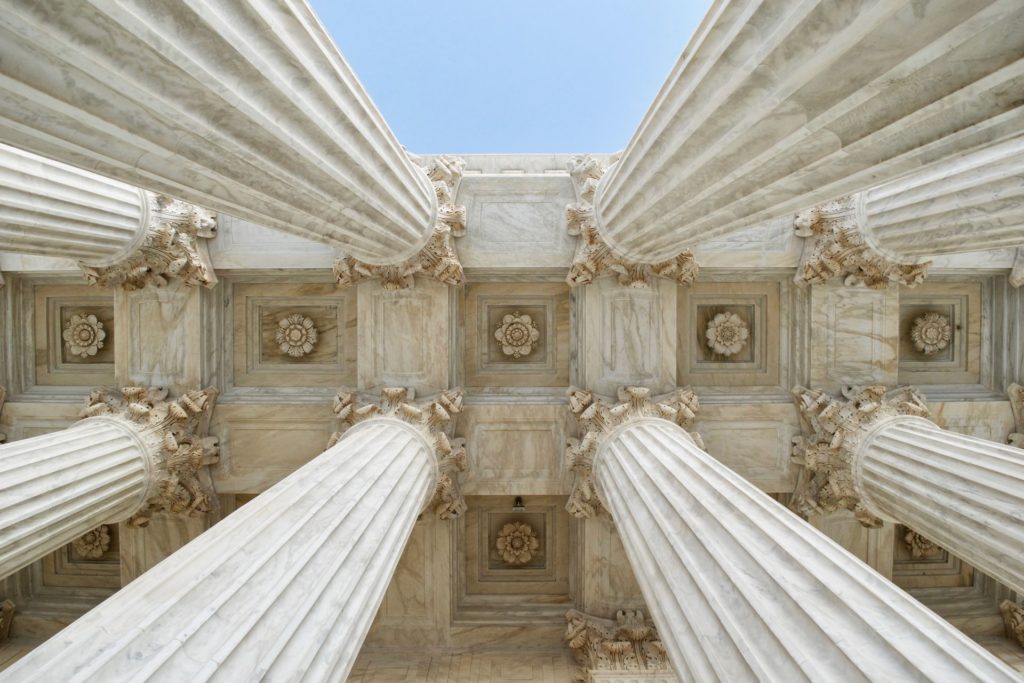
Published January 24, 2022
A question loomed over the March for Life this year: what will next year’s March be for?
The Supreme Court may decide to overturn Roe v. Wade this term, as it has been asked to do in Dobbs v. Jackson. Overturning Roe would send abortion regulation back to the states. This would shift the focus of pro-life advocacy to state legislation.
A decision to reverse Roe would give not just momentum but substance to those state-level battles. State legislation should affirm what pro-lifers have been saying for decades: the question of abortion is not only one of rights, but of duties, responsibilities that society owes toward mothers and that mothers and fathers owe to their children.
The law teaches, as much by what it says as by what it doesn’t say. Harvard Law Professor emeritus Mary Ann Glendon brilliantly argued that Roe (and later Planned Parenthood v. Casey) taught that women’s rights, as the Court construed them, allow women to reject their responsibility as mothers—and that fathers, and society at large, have no corresponding duty to help women carry it out. Dobbs could have a pedagogical power of its own. In correcting Roe and Casey‘s mistaken interpretation of the Constitution, it could begin to undo the damage those decisions have wrought to the American view of women’s rights.
Nearly 30 years ago, in her groundbreaking book Rights Talk, Glendon argued that Roe helped entrench an extreme version of America’s founding myth. Roe identified pregnant women with the American ideal of the “lone rights bearer,” who should be left free from state interference in the pursuit of her freedom and happiness, even to the point of destroying her unborn children if they are too much of an encumbrance.
This ideal has roots in the social contract theory of thinkers like John Locke and Jean-Jacques Rousseau. For them, the origin and end of government lies in the free consent of a group of individuals to the coercive power of the state, for the security of their natural rights to life, liberty and property. This theory of government, by shaping the American Constitution, in turn shaped our vision of what constitutional law is supposed to do: above all else, to protect each person in the exercise of her natural rights. Yet over time, Glendon argued, this important goal became distorted into a vision of unimpeded personal autonomy and privacy, closed off to our preexisting relationships and obligations to others.
The Supreme Court’s decision in Casey exalted that myth. In a joint opinion, Justices Kennedy, O’Connor and Souter traced Roe to a line of earlier cases recognizing “the right of the individual to be free from unwarranted governmental intrusion into matters so fundamentally affecting a person as the decision whether to bear or beget a child.” The opinion presented abortion as the ultimate free choice in a woman’s quest for self-definition, totally abstracted from her relationships and obligations: “At the heart of liberty is the right to define one’s own concept of existence, of meaning, of the universe, and of the mystery of human life.”
Glendon rightly saw, though, that the idea of a “lone rights bearer” is completely at odds with a fundamental truth about human life: we are all born into relationships and communities, with duties of justice and care towards each other. Our rights are grounded in those duties, and true freedom and happiness are to be found in living out our responsibilities, not in absconding from them.
For a society to tell women they can abort their children, and for women to undertake that horrible act, is a nightmarish attempt to escape the truth about who we are.
Other countries, as Glendon pointed out, take a different constitutional approach to abortion, one that better acknowledges reality. While the United States leaves pregnant women with “their constitutional right to privacy and little else,” countries like Germany give the state a greater role in helping women carry out their maternal responsibility. Then and now, a woman in Germany who seeks an abortion must be counseled on the public benefits and social supports available to her, which are more generous than those offered here. And except in cases of emergency, she must also wait three days before obtaining an abortion, which a doctor must certify is the only possible means to relieve her of serious harm to her physical or mental health.
Today, only six countries—among them China and North Korea—have abortion laws as radically permissive as those of the United States. But others, most recently Ireland and Argentina, have steadily followed our trail. It’s important to be clear about exactly what we have been trailblazing for them. It’s not just that we’ve given them an extreme standard by which to measure their own abortion laws. We’ve also led them to abandon approaches that were more grounded in the truth about pregnancy and motherhood, and so better served both women and children.
So how could a Dobbs opinion that overturns Roe and Casey chart a better course? The conservative majority would likely want to show that these cases had no basis in legal text, history or precedent. This originalist response could undo some of the damage wrought by Roe and Casey by suggesting that finding a right to abortion in the Constitution amounts to judicial activism—judges reading their preferred values into the law. Restoring a correct interpretation of the Constitution as either leaving abortion regulation to the states, or as prohibiting abortion entirely, would allow our law once again to teach the truth, undistorted: that the life and health of pregnant mothers and their children impose duties on society that cannot be ignored.
Nationally and locally, we need to find better ways to support mothers and their children in challenging circumstances. It is at best delusional, and at worst criminally negligent, to tell women that abortion is their only or their best option.
Some of the amicus briefs submitted in Dobbs drive this point home. Professors John Finnis and Robert P. George compellingly argue that the Constitution is most properly read to forbid abortion altogether, not just to leave the issue to the states. Helen Alvaré, Teresa Collett and Erika Bachiochi present strong evidence against Casey‘s claim that women rely on abortion access for their personal and professional wellbeing. The evidence runs quite clearly the other way. Arguments like these should help the Court emphasize the big picture in Dobbs, as it failed to do in Roe and Casey. The law should fully protect children in the womb, and should help carve out true, better options for women in single or impoverished motherhood (including engaged fatherhood).
By contrast, Chief Justice Roberts’ middle-of-the-road proposal would be a misguided attempt to protect the interests of women by shoring up Roe‘s false narrative. In oral arguments, Roberts appeared to favor upholding the Mississippi ban on abortions after 15 weeks while changing the meaning of Casey‘s “undue burden” test. Casey held that restrictions on abortions before viability are unconstitutional if they make getting an abortion too difficult to obtain (if they are unduly burdensome). On the new reading, the Mississippi ban would pass muster under a new undue burden test, under which laws must leave women a fair opportunity to get an abortion.
As Sherif Girgis has argued, this incoherent proposal would invite the Court into endless further litigation over the new line for burdensome laws. And to echo Glendon: preserving Roe and Casey would perpetuate the myth that our rights claims allow us to escape our most important duties—and that society has no part to play in helping us live them out.
If Roe is overturned, this year’s national March for Life will go down as a historic one. Let us hope to see in future years a shift to marching in our home states, for the recognition everywhere of a new vision of America, one which upholds the true rights of women and children, and our duties toward them.
Gabrielle Girgis is a Postdoctoral Fellow at the Ethics and Public Policy Center and a Visiting Scholar at Notre Dame.
Gabrielle M. Girgis, Ph.D., is a Postdoctoral Fellow at the Ethics and Public Policy Center.









